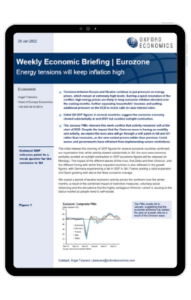Energy tensions in the eurozone will keep inflation high

Tensions between Russia and Ukraine continue to put pressure on energy
prices, which remain at extremely high levels. Barring a quick resolution of the conflict, high energy prices are likely to keep eurozone inflation elevated over the coming months, further squeezing households’ incomes and putting
additional pressure on the ECB to resist calls to raise interest rates.
What you will learn:
- Initial Q4 GDP figures in several countries suggest the eurozone economy slowed substantially at end-2021 but avoided outright contraction.
- The January PMIs released this week confirm that activity remained soft at the start of 2022.
- Despite the impact that the Omicron wave is having on mobility and activity, we expect the euro area will go through a soft patch in Q4 and Q1 rather than recession, as the new variant proves milder than previous Covid waves and governments have refrained from implementing severe restrictions.
Tags:
Related research

Post
Silver lining for China’s residential real estate sector
Residential real estate commencements (floor area) are expected to pick up over 2025. However, activity will remain at structurally lower levels, with Chinese authorities expected to maintain their goal to clamp down on speculative demand.
Find Out More
Post
Uncertainty is the biggest threat to Australia’s growth this year
We have downgraded our forecasts for Australia due to the major disruptions to the global economy caused by changes to US trade policy.
Find Out More